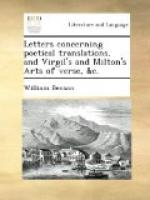In his Description of a Troop of fighting Monks, in his first Book of his Translation of Tasso, are these Lines.
“Their jolly Notes, they Chanted
loud and Clear:
And horrid Helms high on their
Heads they bear.
Than which Verses nothing can be more truly poetical.
But to go farther back than either Fairfax or Spencer, those celebrated Lines in our antient Translation of the Psalms owe their greatest Beauty to their Alliteration.
“The Lord descended from above,
And bow’d the Heavens high,
And underneath his Feet he cast
The Darkness of the Sky.
“On Cherubs and on Cherubims
Full royally he rode,
And on the Wings of mighty Winds
Came flying all abroad.
A Line of Chaucer’s just now offers itself to my Memory, which has almost all the Arts of Poetry in it.
“A Sheffield Whittle bare he in his Hose.
There is a fine Alliteration in the Conclusion of the Line, Bare he in his Hose, and a mix’d one at the Beginning of it. The h in the first Syllables of the second and third Words mixes the Sound very agreeably; and lastly, the Inversion of the Phrase (where the Nominative is put immediately after the Verb) is extremely poetical. Bare he. Chaucer seems (to me) by the help of a delicate Ear, and a curious Judgment, to have learnt all his Graces from Virgil. 1. His Rhyme. 2. His Inversion of the Phrase: And 3. His Alliteratio. The Varying of the Pause he does not seem to have attended to. But to return to Milton.
Having spoken sufficiently of the Initial, I come now to the mix’d Alliteration. And this latter is almost as common as the former, and is to be found in all such Lines as these.
“—And now is come
Into the blissful Field.—
Every Ear must perceive how the f and the l are mingled in the two last Words.
Again,
“—Th[r=]o’ G[r=]oves of My[rr=]h.—
Here the rough r predominates as much as the soft l did in the first Part of the Verse.
Again,
“And Flow’ry O_dours_.—
Here the Allusio Verborum is introduc’d. Flow’r at the Beginning of the first Word, and Dour at the End of the second, make a most agreeable Harmony. The Line concludes with what may be call’d the Assultus, or the Attack upon the Ear.
“—C[=a]ssi[=a], N[=a]rd [=a]nd B[=a]lm.—
These five A’s in four Words at the End of the Line must make themselves perceiv’d if Words can do it. ’Tis of the same kind as Virgil’s,
“—Tumid[=a] aequor[=a] pl[=a]c[=a]t.
But it may be proper to add another Instance or two of the Allusio Verborum.




